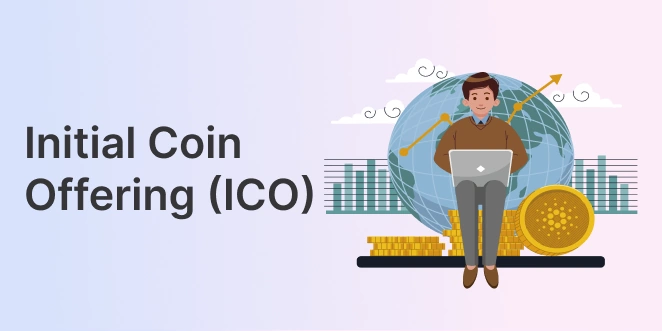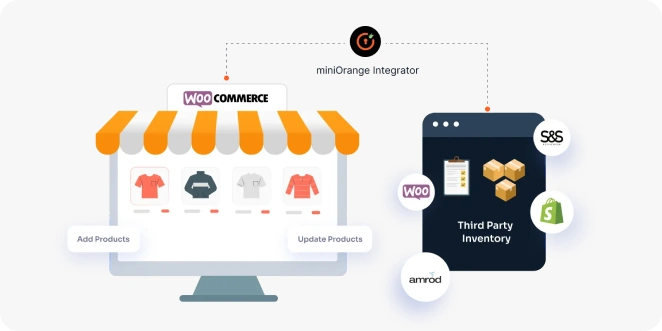With smart contracts, all transactions in the ICO process can be made transparent and securely managed, enhancing trust among investors.
Let’s see in detail how an ICO works, the difference between ICO & IPO, the types of ICOs, and what have been the most successful ICOs in 2024.
How Does an ICO Work?
Initial Coin Offerings are a popular method for businesses and startups to raise funds in the cryptocurrency space. Let’s understand how they work:
1. Creating Tokens: First, a company that wants to launch a new digital coin creates a digital record of its tokens on a blockchain. It then decides on specific features, like how many tokens will be created and how they can be used.
2. ICO Launch: The company publishes a whitepaper detailing its initial coin offering. This whitepaper explains what the project is, what problems it's trying to solve, and how the money raised will be used. It will also detail the token offering, including the price of each token, how many tokens will be available, and how investors can buy them.
3. Investors Buy Tokens: Investors interested in the project then purchase tokens using existing cryptocurrencies like Bitcoin or Ethereum. In some cases, ICOs might accept traditional money (fiat currency), but this is less common.
4. Raising Capital: The money raised from the sale of tokens gets used for developing the project. If the project doesn't reach its fundraising target within a stipulated timeframe, the initial coin offering might be canceled, and coin investors will get a refund on their money.
5. Token Functionality: Once the project launches and development is complete, a coin investor will receive their tokens. These tokens might have different uses, depending on the project. They could give access to a specific service within the project's platform, or they might be tradable on cryptocurrency exchanges (if the project allows it).
ICO vs IPO
| Initial Coin Offering (ICO) | Initial Public Offering (IPO) |
|---|---|
| ICO is a fundraising method where startups in the blockchain space sell new digital tokens (cryptocurrencies) to investors in exchange for capital. | IPO is a fundraising method in which a private company goes public by selling its shares for the first time. |
| Generally less regulated, depending on the country. | Heavily regulated with strict requirements for reporting and transparency. |
| Used to raise capital for new blockchain projects and offer a new digital token or coin. | Used to raise capital for expansion or other corporate purposes. |
| High risk due to less regulation, higher volatility, and uncertain project success. | Lower risk than ICOs due to established business models and regulations, but still subject to market fluctuations. |
| High profits if the cryptocurrency or project succeeds, but also carries a high potential for total loss. | Stable returns, but can also vary based on market conditions and company performance. |
Pros and Cons of ICOs
Investing in ICOs can offer several benefits to coin investors, especially those who are looking for high-reward options. However, like any other fundraising method out there, initial coin offering have its pros and cons. Check them out below.
Pros:
- Easy Access to Funds: Companies that opt for ICOs get money quickly without the need to reach out to banks or give away equity in their company to investors early on.
- High Profitability: The tokens bought during an initial coin offering can rise in value very quickly once the project becomes successful, giving investors a good ROI (return on investment).
- Quick to Sell: ICO tokens are frequently sold on cryptocurrency exchanges. This means that investors may be able to convert their investments into cash more quickly than other types of investments.
- Supports New Ideas: Initial coin offerings can help drive new developments and innovations in the crypto space by providing a means to fund projects, especially in blockchain ICO.
Cons:
- Price Fluctuations: The ICO price of tokens can fluctuate rapidly and unpredictably, allowing investors to lose money as quickly as they gain it.
- Risks of Scam: There have been numerous instances of fraud in the initial coin offering market, where investors lost their money to poorly run or purposefully misleading projects.
- No Success Guarantee: An initial coin offering does not guarantee a company's project will be successful just because it can raise capital. Many projects fail to deliver what they promised, and investors lose their money.
Types of Initial Coin Offerings
In recent years, multiple variations of initial coin offerings have emerged in the market, each tailored to meet specific strategic or regulatory requirements. Here are the main types of initial coin offerings:
1. Private ICO
Private initial coin offerings are limited to a selected number of investors, generally only accredited investors (high net-worth individuals and financial institutions). Participants in private ICOs can choose to set a minimum investment amount.
2. Public ICO
Public initial coin offerings are the most known form of ICO that targets the general public. They follow a period of marketing and building an audience. However, due to regulatory concerns, participants are required to go through some level of compliance checks like Know You Customer (KYC) and Anti-Money Laundering (AML).
3. Hybrid ICO
Hybrid initial coin offerings combine the elements of public and private sales. In this initial coin offering, a company can start with a private sale of tokens to selected institutes or investors, followed by a public sale. The benefit of this model is that it helps companies secure the required minimum funding from selected investors and gain additional funds after launching the ICO to a broader audience.
Latest ICOs in 2024
2024 has proven to be a promising year for the Initial Coin Offerings (ICO) landscape. The sector has seen new entries that are introducing innovation and transformation in the cryptocurrency space. Here are some of the most successful ICOs that were launched in 2024:
1. Dogeverse
In April 2024, meme coin Dogeverse announced that it raised $1 million in its ICO, showcasing the growing interest of investors in meme-inspired cryptocurrencies. According to Techpoint Africa, the company raised these funds in just a matter of 48 hours through its initial coin offering.
2. GreenChain
GreenChain, a blockchain tech company that aims to track and manage carbon emissions through tokens, raised about $50 million in the first days of its ICO launch. The company aims to use blockchain to track and verify carbon emissions, encouraging companies to reduce their environmental impact through a token system that can be used to purchase carbon credits.
3. EduBlock
EduBlock, a platform that allows students and teachers to directly transfer knowledge and skills without intermediaries, claims that its ICO has generated about $40 million. The platform offers tools for creating and managing courses, as well as a blockchain-based certification system that makes educational credentials globally verifiable instantly and securely.
Future of ICOs
As the cryptocurrency sector matures, Initial Coin Offerings are expected to become more widespread. While ICOs offer new investment opportunities, they also carry inherent risks. Understanding these risks and conducting thorough research is crucial before investing.
Emerging trends like increased regulation and a focus on investor protection suggest a shift towards a more professionalized ICO landscape. This might attract institutional investors, further shaping the industry.
For beginners interested in initial coin offerings, staying informed about both the potential and the risks is essential. Consider researching reputable resources on ICOs and blockchain technology before making any investment decisions
To know more about ICOs and related solutions, contact us at: info@xecurify.com
Author





Leave a Comment